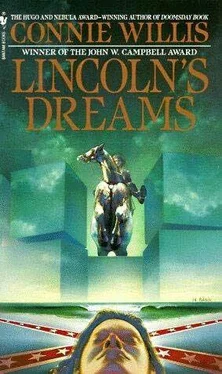Connie Willis - Lincoln’s Dreams
Здесь есть возможность читать онлайн «Connie Willis - Lincoln’s Dreams» весь текст электронной книги совершенно бесплатно (целиком полную версию без сокращений). В некоторых случаях можно слушать аудио, скачать через торрент в формате fb2 и присутствует краткое содержание. Город: New York, Год выпуска: 1992, ISBN: 1992, Издательство: Bantam Books, Жанр: Фантастика и фэнтези, на английском языке. Описание произведения, (предисловие) а так же отзывы посетителей доступны на портале библиотеки ЛибКат.
- Название:Lincoln’s Dreams
- Автор:
- Издательство:Bantam Books
- Жанр:
- Год:1992
- Город:New York
- ISBN:978-0553270259
- Рейтинг книги:3 / 5. Голосов: 1
-
Избранное:Добавить в избранное
- Отзывы:
-
Ваша оценка:
- 60
- 1
- 2
- 3
- 4
- 5
Lincoln’s Dreams: краткое содержание, описание и аннотация
Предлагаем к чтению аннотацию, описание, краткое содержание или предисловие (зависит от того, что написал сам автор книги «Lincoln’s Dreams»). Если вы не нашли необходимую информацию о книге — напишите в комментариях, мы постараемся отыскать её.
presents the story of a young historical researcher who is being pulled deeper and deeper into the time of the Civil War.
Lincoln’s Dreams — читать онлайн бесплатно полную книгу (весь текст) целиком
Ниже представлен текст книги, разбитый по страницам. Система сохранения места последней прочитанной страницы, позволяет с удобством читать онлайн бесплатно книгу «Lincoln’s Dreams», без необходимости каждый раз заново искать на чём Вы остановились. Поставьте закладку, и сможете в любой момент перейти на страницу, на которой закончили чтение.
Интервал:
Закладка:
“She never had a cat. And she didn’t see this cat, either, or read about it someplace. It’s Tom Tita.”
“I’m sure she was convinced of that when she insisted on going to Arlington, and that was why I objected to the trip. But I was wrong. The trip produced a catharsis, a breakthrough. She realized the house in the dream was really her own house, and that the half-buried soldier was a symbol of her own repressed guilt.”
“What’s the cat a symbol for?” And what about her bandaged hands? I was about to say when I realized that Richard, calm and inspiring and compassionate, hadn’t said a word about the second dream. And what did that mean? That she hadn’t told him? Or that she didn’t want to believe what I had told her and had chosen to accept Richard’s explanations: repressive guilt and manifest content and dream precipitant conversion. Terms that meant no more than bilious fever and rheumatic excitement and were as much help to the patient.
“I want to talk to Annie,” I said.
“I’ll let her know you called as soon as she wakes up,” the Good Shrink said. “I have to warn you that she may not want to talk to you. She identifies you with her rejection of her psychosis.”
I hung up on him and went back inside to Lincoln, who had had terrible dreams, too. But nobody had tried to convince him the East Room wasn’t the East Room. Nobody had told him the corpse with the black cloth over its face was a symbol for repressive guilt or a neural impulse chosen at random by his hormones. Nobody had asked him what he’d had to eat before he went to bed.
Kate brought the bibliography over to me. “I’ve starred the ones we have,” she said, pointing at ink notations in the margin, “and marked the branches these are at. Do you want me to have the branches send them over here?”
“No, that’s all right. I’ll go get them tomorrow.”
“What’s Broun’s new book about?”
“Abraham Lincoln,” I said.
“Oh, I didn’t know Lincoln was sick.”
“What?”
“Prodromic dreams are dreams people have when they’re sick and they don’t know it yet. What disease was Lincoln suffering from?”
“Bad dreams,” I said.
Broun was back when I got home, standing in the solarium looking at his African violets. I handed him the bibliography. “Did anybody call?” I asked.
“I don’t know,” he said stiffly. “I left the machine on so you wouldn’t miss any of your messages. Did you find out where Willie Lincoln was buried?”
“No.” I started up the stairs. “Was Lincoln sick when he was shot?”
“He was obsessed with the Civil War,” he said bitterly.
I went on up the stairs and into the study and shut the door, but there were no messages on the answering machine, and Annie didn’t call.
I spent most of the next day rounding up the books listed in the bibliography so Broun could take them with him. The galleys came Federal Express in the afternoon. It was overcast all day, and cold. Broun’s plane didn’t leave till five-thirty, and by the time we left for the airport it was getting foggy.
“I want you to go down to Virginia for me,” Broun said stiffly as soon as we turned onto the Rock Creek Parkway. “I know you disapprove of these wild goose chases, but I need you to talk to a doctor in Fredericksburg.”
Fredericksburg was only fifty miles away. If Annie called I could drive back in an hour and a half’s time. If she called. “What’s the doctor’s name?”
He rummaged in his jacket pocket. “Barton. Dr. Barton. Here’s the address.” He had fished out a folded piece of paper. He unfolded it. “Dr. Stone gave me his name. This Dr. Barton has acromegaly. That’s usually treated before there are any overt symptoms, but he’s old enough that his wasn’t. I want you to find out what kind of dreams he has.” He paused as if waiting for me to object.
“When do you want me to go? Tomorrow?”
“Whenever it’s convenient for you to go,” he said.
I drove past the Lincoln Memorial and onto the bridge. “I had no business saying that about the wild goose chases,” I said. “I know how important this book is to you.”
“An obsession, I think you called it.”
I could see Arlington House up ahead on its snow-covered hill. I thought of Richard telling Annie she was obsessed with war and killing. “I had no right to say that either.”
We turned onto the parkway heading south. “Lincoln suffered from acromegaly,” Broun said as if he were apologizing for his rudeness before when I had asked him if Lincoln was sick. “It’s what made him so tall. It’s a gland disorder. The bones grow too much. The hands and nose get wide and the feet get big. People with acromegaly get rheumatism and diabetes and suffer from melancholia. It can be fatal.”
“And you think that’s what killed him?” I said, sarcastically, and then was sorry.
“I thought it might explain the dreams,” he said, and turned and looked out the side window at the foggy darkness.
I wondered if it had occurred to him, through all these theories of repressed guilt and neural impulses, that the dreams didn’t need any explanation. Lincoln dreamed that he had been killed by an assassin, and two weeks later he lay dead in the East Room. He lost his son, and the little boy’s face came to comfort him in dreams. And where in all this did a gland disorder figure?
I didn’t ask him. I wanted some kind of truce before Broun went off to California. When we pulled into the airport, I said, “I’ll go see this Dr. Barton tomorrow.”
He turned and looked at me, and I knew he didn’t want a battle either. “Just have Mrs. Betts next door take the cat and tell her to water the plants. I left the answering machine on ‘message’ and didn’t say where you’d be in case you wanted to take some time off. I’ve been working you too hard. There’s a nice inn in Fredericksburg. You could drive down and stay for a couple of clays, take a little vacation. Stay till I get back from California if you feel like it.”
“Somebody’s got to do the galleys,” I said, “and you won’t have time in California. Listen, don’t worry about me. I’ll take it easy. I’ll run down to Fredericksburg and then I’ll come back and work on the galleys.”
“Well, at least get somebody to help you with them. It takes so long the other way. Why don’t you ask that girl to help you, the pretty little blonde at the reception the other night, what was her name?”
“Annie,” I said. “But I doubt if she’d want to sit for hours reading a book out loud and checking for typos.”
He scratched at the stubble on his chin. “I watched you two the other night. I got the idea she’d do about anything if you asked her. And vice versa.”
“She’s Richard’s girlfriend.”
“Did you hear that from the horse’s mouth? Or did Richard tell you?”
“You’re going to miss your plane,” I said. “Don’t worry about the galleys. I’ll get them done if I have to read them onto a tape recorder and listen to myself.”
He got his suitcase out of the back and then reached forward to give me the piece of folded paper. “Take care of yourself, son,” he said.
“You, too,” I said. “If you find out what caused Lincoln’s dreams, let me know.”
I went home and started in on the galleys, a long chapter about Ben’s brother, who was in Mansfield’s doomed Twelfth Corps, another, even longer one about Colonel Fitzhugh, whose men called him Old Fancypants and who went on for pages about a gentleman’s duty and the glorious South.
“I thought the book was about Antietam,” I had told Broun the first time I’d read those chapters. “And here it is chapter two and still the spring of 1862. The battle of Antietam didn’t happen till the middle of September.”
Читать дальшеИнтервал:
Закладка:
Похожие книги на «Lincoln’s Dreams»
Представляем Вашему вниманию похожие книги на «Lincoln’s Dreams» списком для выбора. Мы отобрали схожую по названию и смыслу литературу в надежде предоставить читателям больше вариантов отыскать новые, интересные, ещё непрочитанные произведения.
Обсуждение, отзывы о книге «Lincoln’s Dreams» и просто собственные мнения читателей. Оставьте ваши комментарии, напишите, что Вы думаете о произведении, его смысле или главных героях. Укажите что конкретно понравилось, а что нет, и почему Вы так считаете.












